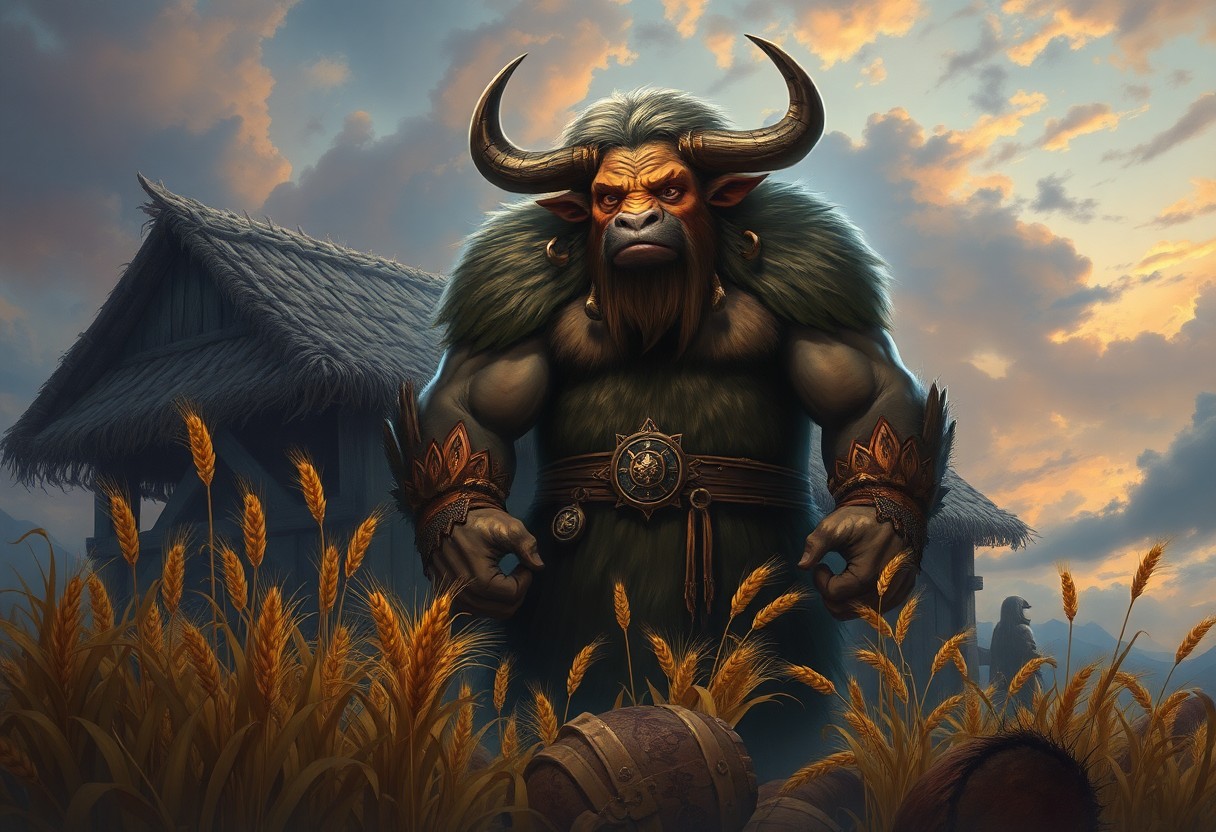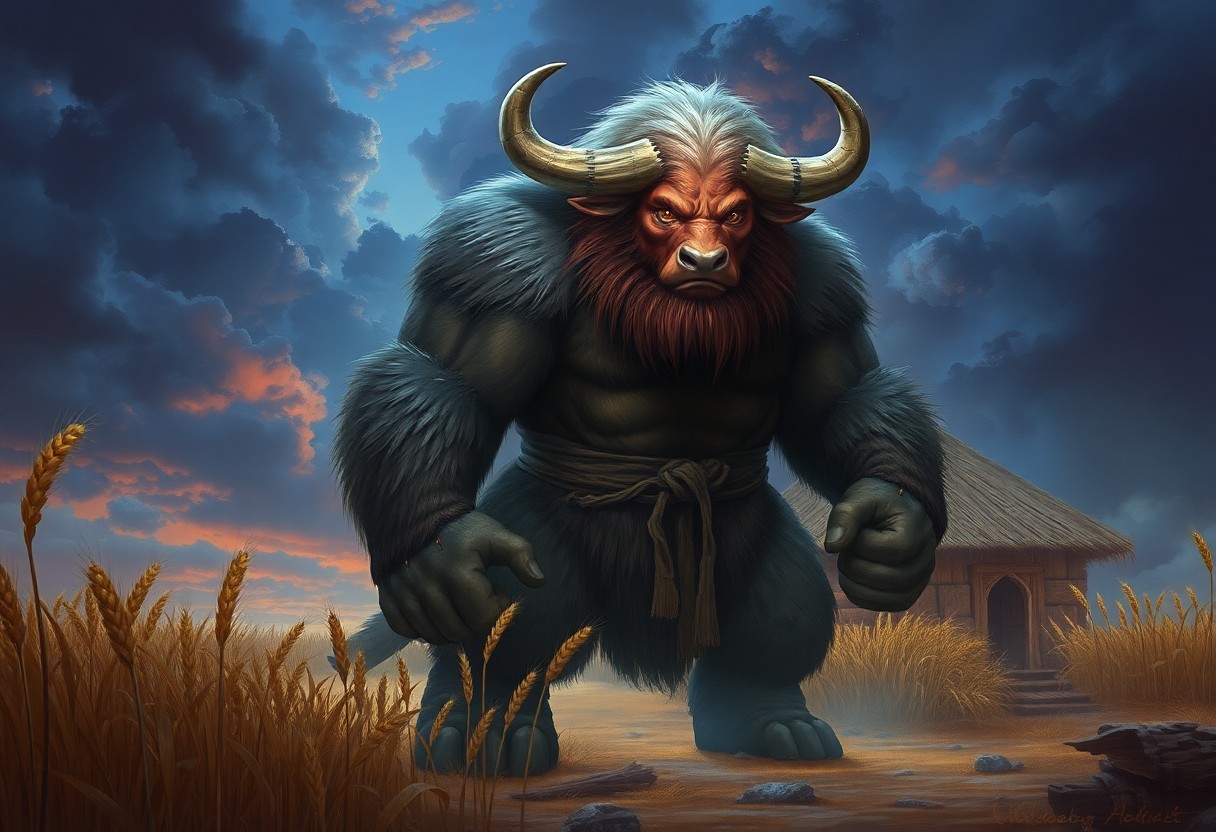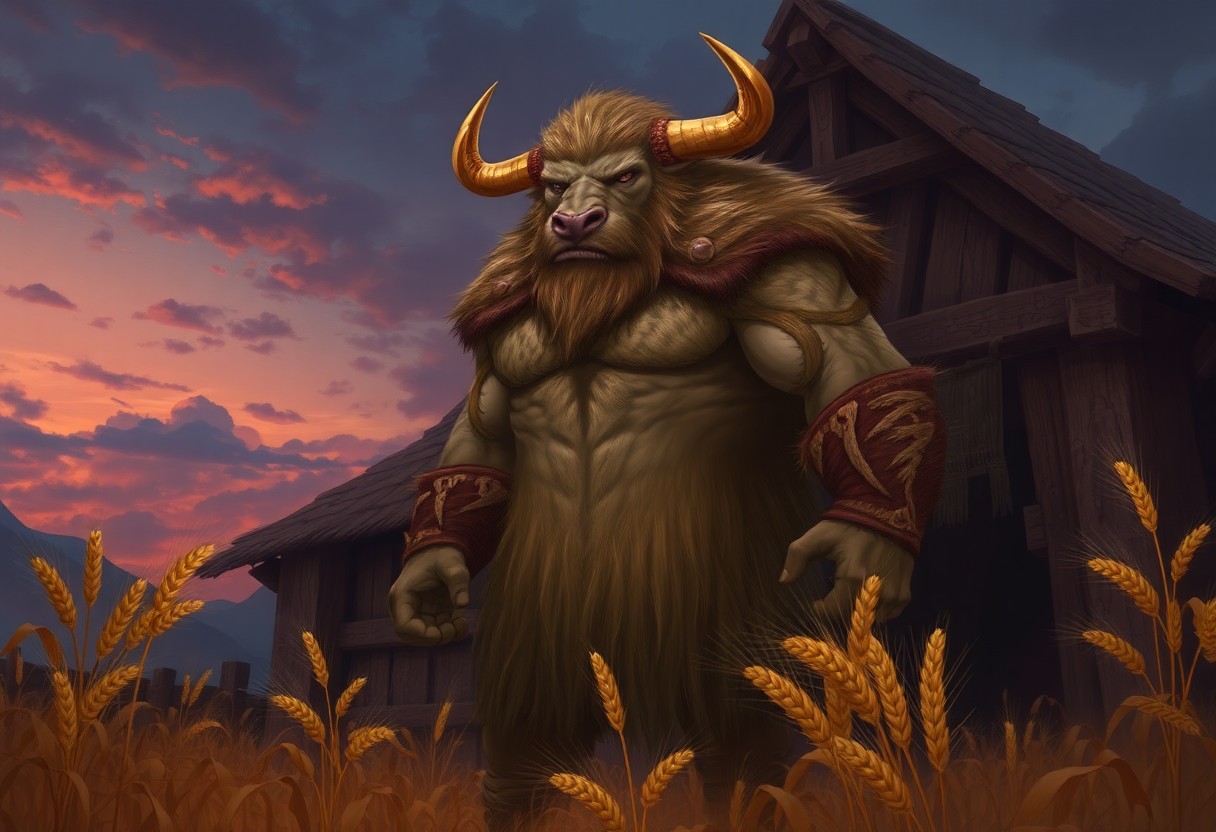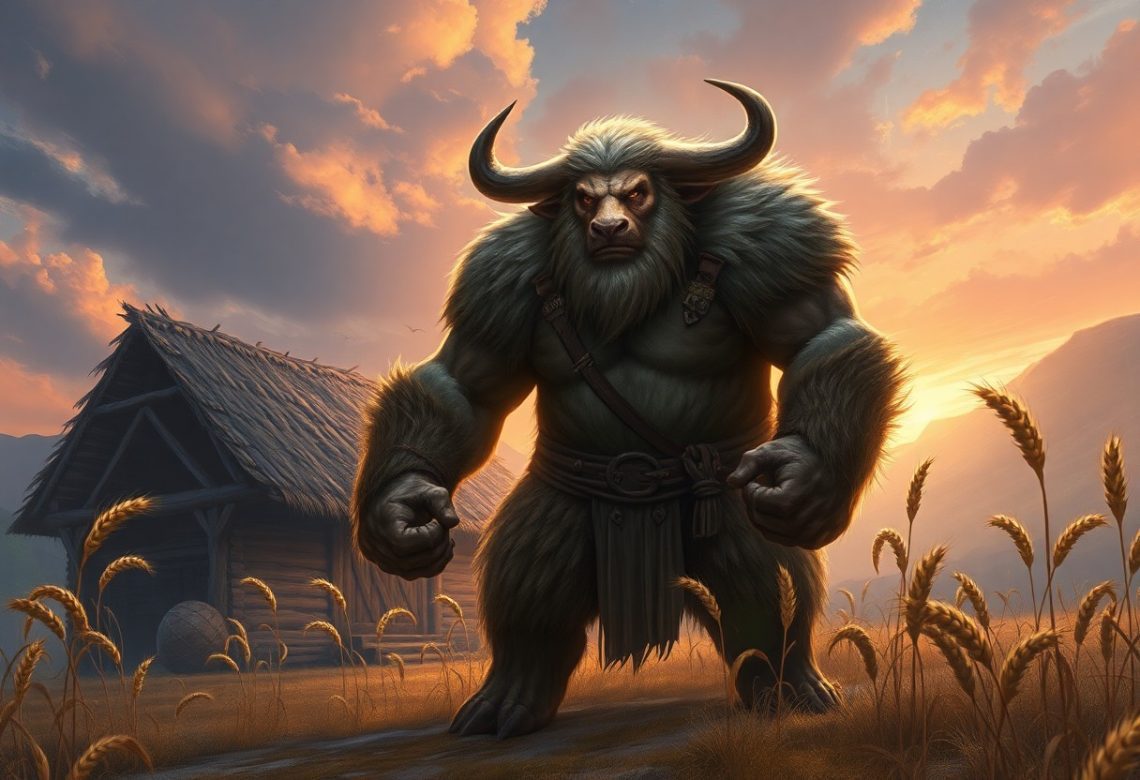Granary guardians like Ovinnyk are vital figures in Slavic folklore, embodying the spirit of protection over harvested grains and crops. You may find it fascinating to learn about this mythical creature, often depicted as a fierce protector with a wolf-like appearance, ensuring the safety of your stored food from intruders and pests. Understanding the significance of Ovinnyk not only enriches your knowledge of cultural traditions but also highlights the timeless relationship between humans and their agricultural heritage. Join us as we research deeper into the world of this storied guardian.
Origin and Mythology
While Ovinnyk is often portrayed as a fearsome guardian, his origins are deeply rooted in Slavic folklore where he embodies the spirit of the harvest. Traditionally, Ovinnyk was believed to protect grain stores and ensure bountiful crops. His presence was a symbol of prosperity, merging agricultural practices with mystical beliefs. As you explore his mythology, you’ll discover how Ovinnyk reflects the union of human effort in farming and the reverence for natural spirits that are integral to Slavic culture.
Historical Significance of Ovinnyk
With the agricultural development in Eastern Europe, Ovinnyk emerged as a significant figure in rural communities, ensuring the protection of crucial grain supplies. His role transcended mere folklore; he was a representation of the hopes and fears of farmers during the seasonal cycles of planting and harvest. Emphasizing his importance, you can see how Ovinnyk served as a reminder of the interconnectedness between human livelihood and the sacredness of the earth.
Folklore and Legends Surrounding Ovinnyk
Among the many tales of Ovinnyk, one recurring theme highlights his dual nature, portraying him as both a kind protector and a vengeful spirit. Local lore suggests that those who disrespected the grains or squandered crops faced his wrath, while those who honored the harvest received his blessings. You’ll find that Ovinnyk’s stories not only entertain but also educate communities about the respect due to nature’s bounty.
But Ovinnyk’s legends are rich and varied, encompassing stories of encounters between humans and this enigmatic spirit. In some tales, farmers leave offerings of grain to appease Ovinnyk, ensuring their fields flourished. In others, his ghostly figure would be seen wandering grain fields late at night, watching over the crops. These narratives serve not only to instill respect for agricultural practices but also to create a communal identity, connecting you and your tradition through generations of shared reverence for Ovinnyk, the guardian of the harvest.

Role in Agriculture
There’s a significant connection between Ovinnyk and the agricultural practices of rural communities. As the fierce protector of granaries, Ovinnyk ensures that the harvests remain safe from pests and thieves. You can see how this guardian figure embodies the essence of agricultural stewardship, linking the well-being of crops to the prosperity of those who depend on them. By honoring Ovinnyk, you recognize the symbiotic relationship between nature, harvest, and humanity’s efforts to sustain itself through farming.
Symbolism of Good Harvests
For many, Ovinnyk represents the promise of good harvests and abundant yields. When you think of this guardian, you often associate him with bountiful fields and the nourishing food that sustains your community. His presence symbolizes not only the protection of grain and crops but also the hope and prosperity that accompany a fruitful season. You can appreciate how this symbolism fosters a deeper respect for the land and the dedication required for successful farming.
Rituals and Practices to Honor Ovinnyk
Ovinnyk is fervently honored through various rituals and practices that aim to secure blessings for the harvest. You may find communal gatherings where offerings are made to this guardian, ensuring his protective presence over your crops and granaries. Traditional ceremonies often include prayers, songs, and symbolic acts that celebrate the fruits of the land, reflecting your gratitude for the sustenance he provides.
A powerful way to honor Ovinnyk is through seasonal festivals dedicated to the harvest. During these events, participants engage in communal prayers and share their harvest bounty while singing traditional songs that recount Ovinnyk’s stories. You might also create small altars adorned with grains and flowers, offering symbols of gratitude and inviting Ovinnyk’s blessing for future crops. By partaking in these customs, you connect with your community and foster a shared appreciation for the agricultural cycles that sustain you.

Ovinnyk in Modern Culture
Even in modern culture, Ovinnyk continues to resonate deeply with the Ukrainian people. This fearsome guardian of the granary serves as a symbol of protection and abundance, reminding you of the importance of safeguarding crops and resources. His legacy endures in various forms, influencing contemporary attitudes towards agriculture and community values. You’ll find that Ovinnyk’s presence is subtly woven into the fabric of modern Ukrainian life, from celebrations to everyday traditions.
Depictions in Literature and Art
Any exploration of Ovinnyk’s character in literature and art showcases his multifaceted nature. Writers and artists depict him as both a fierce protector and a benevolent figure, embodying the agricultural spirit of Ukraine. Your understanding of Ovinnyk will expand as you encounter various interpretations that range from dramatic portrayals to whimsical representations, highlighting his enduring impact on the cultural psyche.
Influence on Ukrainian Traditions
About Ovinnyk’s influence on Ukrainian traditions, you’ll discover that he plays an necessary role in agrarian celebrations and rituals. Festivals that honor the harvest often invoke his spirit, ensuring prosperity in the coming seasons. Many customs surrounding grain and harvest are steeped in his lore, promoting unity and gratitude among communities. You may find that these traditions not only celebrate agricultural success but also connect you to your cultural heritage.
Influence on modern Ukrainian traditions is profound, as Ovinnyk signifies a deep-rooted respect for the land and its resources. You will notice that several harvest festivals embrace his symbolism, with rituals performed to invite his protection over crops and ensure bountiful yields. This connection to agricultural practices fosters a sense of community unity, binding you to the generations that have come before you. As you engage with these traditions, you’ll appreciate how Ovinnyk’s legacy continues to nourish both the land and spirit of the Ukrainian people.

Comparisons with Other Guardians
Many cultures have their own protective spirits, each designed to safeguard vital resources. This table compares Ovinnyk with other mythological guardians and their domains:
| Guardian | Domain |
|---|---|
| Ovinnyk | Granaries and harvests |
| Domovoy | Household and domestic order |
| Leshy | Forests and wildlife |
| Vodnik | Water bodies |
Similar Spirits in Slavic Mythology
Guardians of granaries are prevalent among Slavic folklore, often embodying the spirit of the harvest. These beings not only protect the stored grains but also ensure the fertility of the land. By honoring these spirits, you engage in a tradition that celebrates the vital connection between nature and sustenance.
Ovinnyk versus Other Agricultural Deities
Between Ovinnyk and other agricultural deities, a significant distinction lies in their specific roles and responsibilities. While many deities oversee agriculture generally, Ovinnyk specializes in the protection of granaries, reflecting the cultural importance of stored food in Slavic societies.
With Ovinnyk focused solely on safeguarding granaries, you see a unique emphasis on the stored bounty, which was vital for survival through the harsh winters. In contrast, other agricultural deities like Ceres or Demeter encompass broader aspects of crops and fertility, whereas Ovinnyk ensures that the fruits of your labor are secure and protected, reflecting a more localized and immediate concern for abundance at home.
Preservation of Ovinnyk’s Legacy
After centuries, the enduring legacy of Ovinnyk still resonates within local communities, emphasizing the importance of preserving this significant guardian’s story. By engaging with cultural traditions and rituals, you can help keep Ovinnyk’s memory alive and ensure that future generations appreciate the historical significance of the granaries and the protector associated with them. Every act of remembrance reinforces Ovinnyk’s role in safeguarding not just grains, but also the heart of your community’s heritage.
Contemporary Festivals and Celebrations
Alongside various folklore, contemporary celebrations honoring Ovinnyk bring communities together, merging ancient customs with modern festivities. You might find vibrant festivals featuring traditional songs, dances, and food that depict the spirit of Ovinnyk, fostering a sense of unity and shared purpose. Participating in these events allows you to connect with your cultural roots while celebrating the legacy of the guardian.
Efforts to Maintain Cultural Heritage
Heritage committees and local organizations are dedicated to keeping the story of Ovinnyk thriving through education and festivals, ensuring that the cultural significance of this figure remains palpable. This involves not just the revival of old traditions but also adaptations that resonate with younger generations. You can contribute by attending local events, volunteering, or sharing Ovinnyk’s tale in your conversations, weaving it into the everyday fabric of your community.
A collaborative approach is crucial in these efforts, where artists, educators, and local leaders come together to promote Ovinnyk’s narrative. By hosting workshops, exhibitions, and storytelling sessions, you can enrich the understanding of this cultural icon. Engaging students and families in preservation projects ensures that the legacy of Ovinnyk is interwoven with modern life, making the guardian’s story relevant today and for generations to come.
Summing up
Hence, understanding the lore of Ovinnyk—the fearsome guardian of the granary—allows you to appreciate the rich cultural heritage tied to agricultural practices. This legendary figure symbolizes protection and prosperity, reminding you of the vital role that guardianship plays in safeguarding your resources. By recognizing the significance of Ovinnyk, you connect deeper with traditions that highlight the importance of respecting and valuing the bounty of the earth. Embrace this knowledge as it enriches your perspective on folklore and agricultural stewardship.





